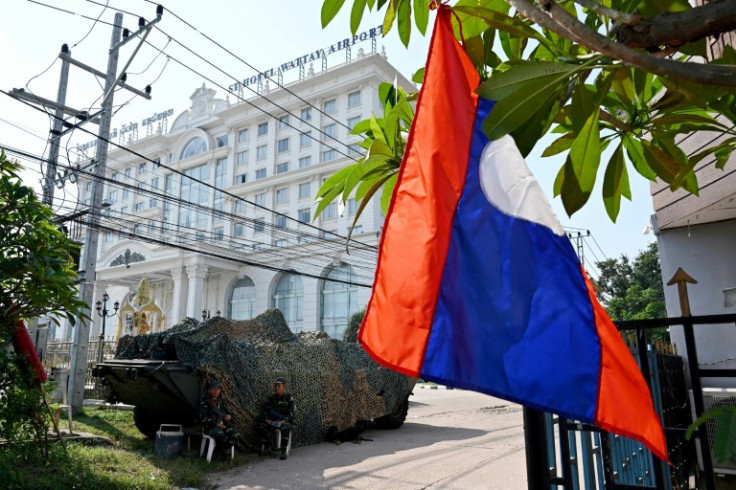SE Asian Summit Seeks Progress On Myanmar Civil War

Southeast Asian leaders met for talks with a Myanmar junta representative at a regional summit Wednesday as they try to kickstart faltering diplomatic efforts to broker an end to the country's civil war.
The disputed South China Sea will also be on the agenda at the Association of Southeast Asian Nations (ASEAN) gathering, after months of violent clashes between Chinese vessels and Philippine and Vietnamese fishermen.
ASEAN has tried to no avail for three years to find a negotiated solution to the Myanmar crisis, which has left thousands dead and forced millions to flee their homes.
The bloc barred junta leaders from its summits in the wake of their February 2021 coup and the generals refused invitations to send a "non-political" representative instead.
But the junta has backed down and sent a senior foreign ministry official to the three-day meet in Laos -- its first representation at a top-level gathering in three and a half years.
The U-turn comes two weeks after the military issued an unprecedented invitation to its enemies for talks aimed at ending the conflict, following a series of battlefield defeats.
Weeks after it ousted Aung San Suu Kyi's elected government, the junta agreed to a "five point consensus" plan with ASEAN to restore peace, but then ignored it and pushed ahead with a bloody crackdown on dissent and opposition to its rule.
Malaysian Foreign Minister Mohamad Hasan, whose country takes over the ASEAN chair after the summit, said it was time for Myanmar to cooperate.
"Myanmar also has to listen to ASEAN. They have to abide by the ASEAN charter because it's part of ASEAN," he told reporters.
Officials hope that the leaders' first face-to-face talks in three and a half years with a junta representative -- foreign ministry permanent secretary Aung Kyaw Moe -- could open the way to a breakthrough.
Aung Kyaw Moe joined a meeting of ASEAN foreign ministers on Tuesday where he asked for "understanding as Myanmar tried to bring a peaceful solution", Thai foreign ministry spokesman Nikorndej Balankura told reporters.
But Daniel Kritenbrink, the top US diplomat for East Asia, voiced doubts at the idea the junta was moderating.
He said that Secretary of State Antony Blinken, who is representing the United States at the ASEAN meeting, would press for the junta to take steps such as reducing violence, releasing political prisoners, and engaging with the opposition.
"Unfortunately, we have seen virtually zero progress on any of those priorities," Kritenbrink said.
Mustafa Izzuddin, international affairs analyst at Solaris Strategies Singapore, said the Myanmar crisis would "define the future of ASEAN as to its relevance in navigating a shifting geopolitical landscape."
"The longer the Myanmar crisis remains unresolved, the greater the risk of ASEAN outliving its usefulness in resolving conflicts within the Southeast Asian region," he told AFP.
Groups fighting against the junta are also unimpressed by the diplomatic efforts.
Padoh Saw Taw Nee, a spokesman for the Karen National Union (KNU), which has been battling the military for decades along the border with Thailand, said three years of ASEAN-led peace talks had only shown the bloc's "dysfunctional mechanism".
"ASEAN really needs to coordinate with the two big powerful countries, China and the US. Without the two big power's green light ASEAN couldn't get anywhere."
The Myanmar crisis has dominated every high-level meeting since the coup but the bloc has been divided, with Indonesia, Malaysia and the Philippines leading calls for tougher action against the generals.
Philippine President Ferdinand Marcos is also expected to push discussions on the South China Sea, where Chinese coast guard and other vessels have rammed, deployed water cannons, and blocked Philippine government vessels in recent months.
This month Vietnam condemned China's "brutal behaviour" after 10 of its fishermen were beaten with iron bars and robbed of thousands of dollars' worth of fish and equipment.
Beijing claims almost the entirety of the South China Sea, a waterway of immense strategic importance through which trillions of dollars in trade transits every year.
Four ASEAN members -- the Philippines, Vietnam, Indonesia and Brunei -- have competing claims to various small islands and reefs.
Chinese Premier Li Qiang arrives on Wednesday, a day before holding talks with the bloc's leaders and joining an "ASEAN Plus Three" summit with new Japanese Prime Minister Shigeru Ishiba and President Yoon Suk Yeol of South Korea.
Indian Prime Minister Narendra Modi will also hold talks with ASEAN on Thursday.
Wars in the Middle East and Ukraine are expected to feature in discussions.
© Copyright AFP 2025. All rights reserved.





















